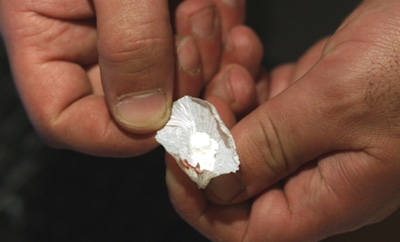We can already identify some of the trends that are likely to mark the evolution of organized crime in 2014. One is the issue of criminal migration, as organized crime in Mexico and Colombia, under increasing security force pressure, follows the path of least resistance, and sets itself up in other countries.
As we have seen with the collateral damage of nations that act as drug transshipment points, the trends of increasing violence, the growth of local organized crime groups and surges in domestic consumption of drugs are likely to follow, as transnational crime, be it Colombian or Mexican, establishes a presence in these foreign nations. The Mexicans already have outposts throughout the Northern Triangle countries, El Salvador, Guatemala and Honduras, and continue to push down into Central America. Colombian organized crime syndicates have been seen in Venezuela, Ecuador, Bolivia and as far afield as Spain.
One of the major changes in drug trafficking has been the growth in domestic markets within Latin America, most particularly Brazil and Argentina, but with Mexico, Colombia and even Chile registering growth in criminal earnings from the local distribution of drugs. While Colombian cocaine production makes up 80 percent of the US market, production in both Peru and Bolivia is feeding the domestic markets of Brazil and Argentina, with a percentage of cocaine also heading towards the lucrative European market. These changing markets are giving birth to different types of organized crime. While Colombians still dominate the drug trade in South America, there is evidence of sophisticated organized crime syndicates developing in other countries.
(The following article is part of InSight Crime’s Game Changers 2013: click to download pdf)
The El Salvador gang truce stumbles on, but few believe it will survive, let alone turn into a more meaningful peace process. Negotiations with the FARC in Colombia continue, and will be the top issue in presidential and congressional elections. It is likely that the smaller rebel group of the National Liberation Army (ELN) will also be granted a seat at peace talks. The rhythm and success of these talks will be reflected in the violence of the Colombian civil conflict as both sides seek to gain victories on the battlefield that they can translate into bargaining chips at the negotiating table.
Honduras will see a new president take office amid increasing chaos and the strengthening of organized crime. Neighboring El Salvador has its own presidential elections that will doubtless impact the gang truce and violence in this tiny Central American nation. The regional superpower, Brazil, will be hosting the 2014 FIFA World Cup, and the eyes of the world will turn towards this massive nation. While the pacification programs in the notorious favelas of Rio continue, the prison-based organized crime syndicates like the First Capital Command (PCC) grow in strength. The notoriously violent Brazilian police force will do all it can to isolate the games from the criminals.
Venezuela lurches from crisis to crisis, with President Nicolas Maduro’s unsteady hand on the tiller. The corruption in the Chavista regime continues to grow, and elements of the military deepen their involvement in drug trafficking, even as express kidnappings in Caracas and the murder rate are at epidemic levels.
Paraguay, often overlooked, is South America’s premier producer of marijuana. It is also home to South America’s newest rebel group. Peru, now the world’s principal producer of cocaine, must also be closely monitored. It’s rebel group, the Shining Path, under pressure from the security forces, has deepened its involvement in the drug trade. Bolivia, another coca producer and important cocaine transshipment nation, has enviably low levels of crime. However, there are clear indications that transnational criminal syndicates have been establishing a presence in the city, and province, of Santa Cruz.
There is overwhelming evidence that with attention focused on Central America, the Caribbean is again becoming important as a drug smuggling route. The chaos in Haiti makes this nation a favorite stopover point for cocaine shipments, but few of the islands have the capacity to take on sophisticated transnational organized crime.
As always, organized crime remains the most adaptable of beasts, looking for any opportunity to turn a profit. It is likely that in 2014 it will look for opportunities in a more diverse range of locations.

